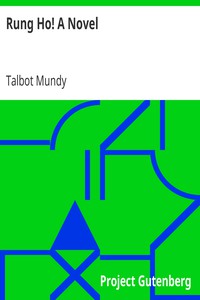Rung Ho! A Novel, Talbot Mundy [free ebook reader for ipad .txt] 📗

- Author: Talbot Mundy
Book online «Rung Ho! A Novel, Talbot Mundy [free ebook reader for ipad .txt] 📗». Author Talbot Mundy
Men came and went—men almost of all castes and many nationalities. Priests—not all of them fat, but every single one fat-smiling—sunned themselves, or waited in the shade until they could have audience; no priest of any Hindoo temple had to wait long to be admitted to that Rajah's presence, and there was an everlasting chain of them, each with his axe to grind, coming and going by day and night.
Color rioted in the blazing sun and deep, dark shadows lurked in all the thousand places where the sun could never penetrate. It was India in essence—noise and blaze and flouted splendor, with a back-ground and underground of mystery. Any but the purblind British could have told at half a glance, merely by the attitude of Howrah's armed sepoys, that a concerted movement of some kind was afoot—that there was a tight-held thread of plan running through the whole confusion; but no man—not even a native—could have guessed what secret plotting might be going on within the acres of the straggling palace.
From the courtyard there was no least hint obtainable even of the building's size; its shape could only have been marked down from a bird's-eye view aloft. Even the roof was so uneven, and so subdivided by traced and deep-carved walls and ramparts, that a sentry posted at one end could not have seen the next man to him, perhaps some twenty feet away. Building had been piled on building—other buildings had been added end to end and crisscrosswise—and each extension had been walled in as new centuries saw new additions, until the many acres were a maze of bricks and stone and fountain-decorated gardens that no lifelong palace denizen could have learned to know in their entirety.
Within—one story up above the courtyard din—in a spacious, richly decorated room that gave on to a gorgeous roof-garden, the Maharajah sat and let himself be fanned by women, who were purchasable for perhaps a tenth of what any of the fans had cost. Another woman, younger than the rest, played wild minor music to him on an instrument not much unlike a flute; they were melancholy notes—beautiful—but sad enough to sow pessimism's seed in any one who listened.
His divan—carved, inlaid, and gilded—faced the wide, awning-hung opening to the garden. Round him on all three sides was a carved stone screen through whose interstices came rustlings and whisperings that told of the hidden life which sees and is not seen. The women with the fans and flute were mere court accessories; the real nerves of Asia—the veiled intriguers whom none may know but whose secret power any man may feel—could be heard like caged birds crowding on their perches.
Now and then glass bracelets tinkled from behind the screen; ever and again the music stopped, until another girl appeared to play another melancholy air. But the even purring of the fans went on incessantly, and the poor, priest-ridden fool who owned it all scowled straight in front of him, his brows lined deep in thought.
It is a strange malady, that which seizes men whom fate has elevated to a throne. It acts as certain Indian drugs are known to do—deprives its victim of the power to act, but intensifies his ability to think, and theorize, and feel. Howrah, with untold treasure in his vaults, with an army of five thousand men, with the authority and backing that a hundred generations give, could long for more—could fear the loss of what he did have—but could not act.
The priests held him fear-bound. His brother held him hate-bound. His women—and not even he knew, probably, how many of them languished in the secret warren inside those palace walls—kept him restless in a net of this-and-that-way-tugged intrigue. Flattery—and that is by far the subtlest poison of the East—blinded him utterly to his own best course, and kept him blind. Luxury unmanned him; he who had once held the straightest spear in western India, and for the love of feeling red blood racing in his veins had ridden down panthers on the maidan, was flabby now; deep, dark rings underlined his eyes and the once steel-sinewed wrist trembled.
His brother Jaimihr in his place, unsapped yet by decadent delights, would have loosed his five thousand on the countryside—butchered any who opposed him—pressed into service those who merely lagged—and would have plunged India in a welter of blood before the priests had time to mature their plans and arrange to keep all the power and plunder to themselves. But Jaimihr had to stalk lesser game and content himself with pricking at the ever-growing hate that gradually rendered the Maharajah decisionless and sorry only for himself.
A first glimpse at Howrah, particularly in the shaded room, showed a handsome man, black-bearded, lean, and lithe; a second look, undazzled by his jewelry or by the studied magnificence of each apparently unstudied movement, betrayed a man whose lightest word was law, but who feared to give the word. Where muscles had been were unfilled folds of skin that shook; where a firm if selfish mouth had once smiled merrily beneath a pointed black mustache, a mouth still smiled, but meanly; the selfishness was there, but the firmness had faded.
His eyes, though, were his most marked feature. They were hungry eyes, pathetic as a caged beast's and as savage. No one could see them without pitying him, and no man in his senses would have accepted their owner's word on any point at all. A man looks as he did when the fire of a burning velt has circled him and there is no way out. There was fear behind them, and the look of restless search for safety that is nowhere.
In one of the many-columned courtyards of the palace was a chained, mad elephant whose duty was to kneel on the Rajah's captive enemies. In another courtyard was a big, square tank with a weedy, slippery stone ramp at one end; in the tank were alligators; down the ramp other of the Rajah's enemies, tight-bound, would scream and struggle and slide from time to time. But they were only little enemies who died in that way; the greater ones, who had power or influence, lived on and plotted, because the owner of the execution beasts was afraid to put them to their use.
Below, in damp, unlit dungeons, there were silken cords suspended from stone ceilings; their ends were noosed, and the nooses hung ten feet above the floor; those told only, though, of the fate of women who had schemed unwisely—favorites of a week, perhaps, who had dared to sulk, listeners through screens who had forgotten to forget. No men died ever by the silken cord, and no tales ever reached the outside world of who did die down in the echoing brick cellars; there was a path that led underground to the alligator tank and a trap-door that opened just above the water edge. Night, and the fungus-fouled long jaws, and slimy, weed-filled water—the creak of rusty hinges—a splash—the bang of a falling trap—a swirl in the moonlit water, and ring after heavy, widening ring that lapped at last against the stone would write conclusion to a tragedy. There would be no record kept.
Howrah was childless. That, of all the hell-sent troubles that beset him, was the worst. That alone was worse than the hoarded treasure whose secret he and his brother and the priests of Siva shared. Only in India could it happen that a





Comments (0)